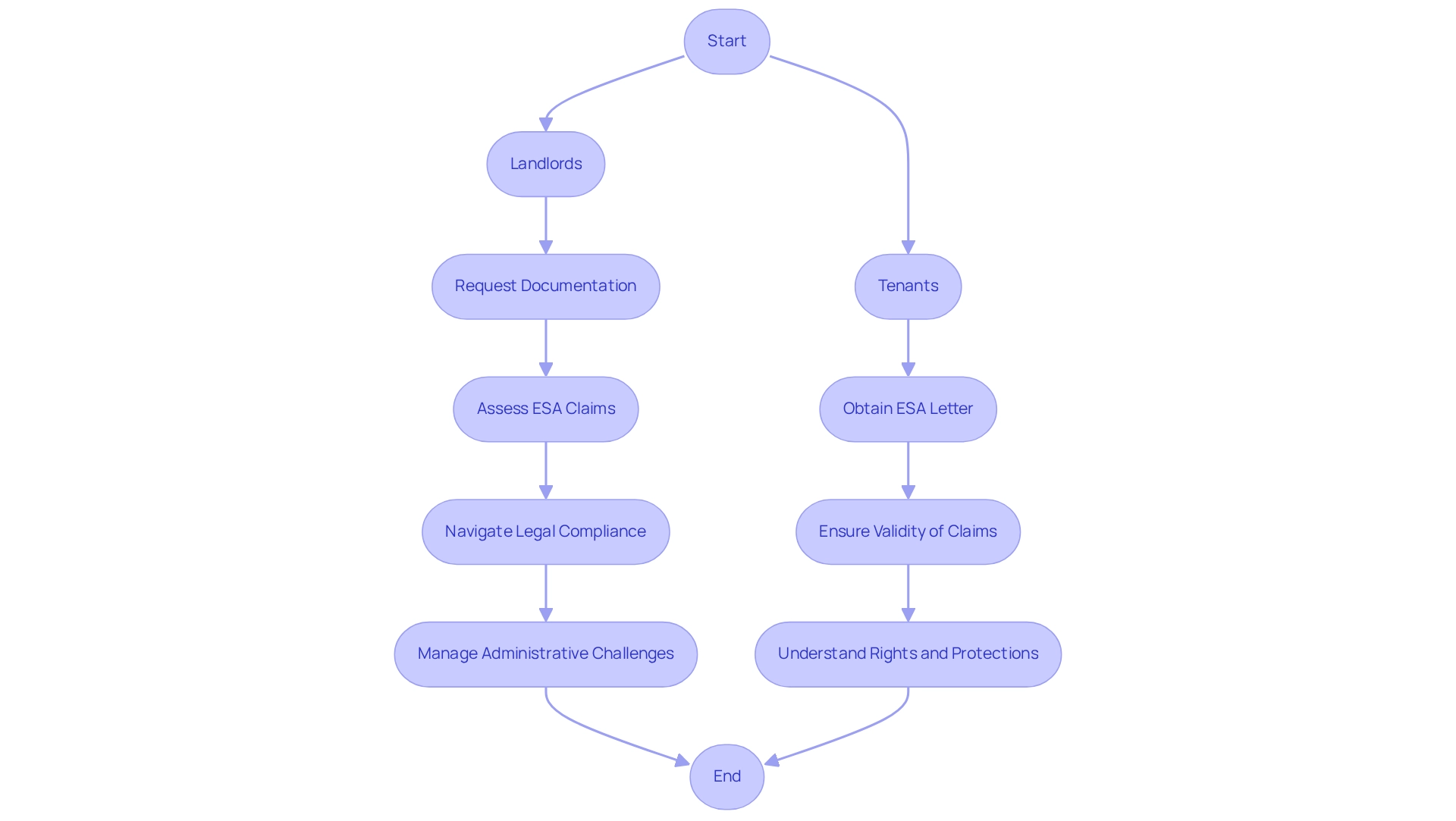

Florida Passes New Laws Regarding Emotional Support Animals: Key Changes and Impacts
by Lena Park
Last updated: July 10, 2025
Verified and Approved by:
Angela Morris,
MSW, LCSW
Fact Checked

Overview
Florida’s new laws regarding emotional support animals (ESAs) aim to address the emotional challenges faced by many individuals by introducing stricter documentation requirements. These changes are designed to ensure the legitimacy of ESA claims while also protecting the rights of both tenants and landlords.
By allowing landlords to request comprehensive verification from mental health professionals, these laws seek to reduce fraud and foster a more responsible relationship between property owners and residents in need of emotional support. This approach not only safeguards the interests of landlords but also acknowledges the importance of ESAs in providing comfort and companionship to those who may be struggling.
It’s a step towards creating a supportive environment where everyone can feel understood and cared for.
Introduction
In the realm of mental health support, emotional support animals (ESAs) have become vital companions for many individuals facing emotional and psychological challenges. These struggles can often feel overwhelming, leaving individuals in search of comfort and understanding. In Florida, recent legislative changes have reshaped the landscape of ESA regulations, introducing new requirements designed to prevent misuse while ensuring that genuine needs are met. These updates not only clarify the rights of ESA owners but also hold landlords accountable, creating a more structured environment for everyone involved.
As the number of registered ESAs continues to rise, it becomes increasingly important to understand these evolving laws. This knowledge is essential for both tenants seeking solace and landlords navigating their responsibilities. The changes in Florida’s ESA laws have significant implications for all parties, emphasizing the importance of compliance in fostering a respectful and supportive housing environment. By embracing these updates, we can create a community where individuals find the emotional support they need and deserve.
Overview of Emotional Support Animal Regulations in Florida
In Florida, emotional assistance creatures (ESAs) are safeguarded by the Fair Housing Act, which mandates landlords to provide reasonable adjustments for tenants with disabilities. Unlike service creatures, ESAs do not require specialized training and can include various types of species, though dogs and cats are the most common. The main role of an ESA is to provide comfort and assistance to individuals facing emotional or psychological difficulties.
Many individuals struggle with emotional challenges that can feel overwhelming. Recent legislative changes have refined the process for obtaining an ESA letter, which previously involved a straightforward assessment by a licensed mental health professional. This letter would confirm the individual’s need for an ESA. However, the absence of stringent regulations had led to instances of misuse and misrepresentation of ESAs, highlighting the necessity for reform.
As of 2025, Florida has observed a significant rise in the number of registered emotional assistance creatures, indicating a growing dependence on these companions for mental well-being. The demand for assistance dogs in different areas, including Australia, has been increasing by 20% each year, indicating a wider trend in the dependence on helper creatures. The state continues to uphold federal protections, ensuring that ESA owners are safeguarded against discrimination. It is crucial for individuals to ensure their ESA documentation is valid and compliant with state laws to maintain their rights under the Fair Housing Act. As mentioned, “In Florida, state regulations maintain federal laws that safeguard emotional assistance owners from discrimination, but it’s crucial to verify your ESA is legitimate in the state of Florida and that you are adhering to all state regulations to keep your companion by your side.”
At Wellness Wag, we understand the importance of emotional support, which is why we provide a streamlined online process for obtaining legitimate ESA letters through our telehealth services. Our mission is to empower individuals by dismantling obstacles and providing them with the knowledge and resources essential to experience the transformative power of emotional companionship.
Frequently Asked Questions
- What is an ESA letter? An ESA letter is a document from a licensed mental health professional that verifies your requirement for an emotional assistance creature.
- How do I obtain an ESA letter through Wellness Wag? You can start the process by scheduling a consultation through our website, where our professionals will guide you through the necessary steps.
- Are there any specific requirements for my ESA? While ESAs can be different kinds of creatures, they must offer comfort and assistance to you personally.
Expert opinions emphasize the importance of adhering to these regulations to prevent abuse of the system, which can undermine the legitimacy of ESAs and the vital role they play in mental health care. As Florida passes new laws regarding emotional support animals, individuals seeking ESAs must remain informed about current regulations and their rights.
Key Changes in Florida’s Emotional Support Animal Laws
Recent legislative updates in Florida pass new laws regarding emotional support animals, which introduce significant changes to emotional assistance regulations and reflect a growing understanding of the challenges faced by individuals with mental health issues. One of the most notable adjustments is that landlords are now allowed to request additional documentation from a tenant’s treatment provider to validate the necessity of an ESA. This requirement aims to reduce fraudulent claims, ensuring that ESAs are truly necessary for emotional support. This is especially vital for students with disabilities who rely on these companions to alleviate symptoms associated with their conditions. Furthermore, the new laws impose penalties for individuals who misrepresent their need for an ESA, categorizing such actions as a second-degree misdemeanor.
While landlords cannot impose fees for ESAs, they do retain the right to hold ESA owners responsible for any damages caused by their pets. As JoAnn Nesta Burnett points out, “Individuals with ESAs are responsible for any damage caused to the premises or to another person or creature by the ESA.” This balance of rights and responsibilities reflects a more structured approach to ESA regulations, aiming to protect both renters and landlords. Moreover, under the Fair Housing Act, landlords are forbidden from demanding tenants to declaw their emotional assistance creatures or imposing additional fees, further protecting the rights of ESA owners.
In 2025, Florida’s ESA laws also introduced new requirements, including the necessity for documentation that clearly outlines the need for an ESA. This corresponds with the state’s dedication to ensuring that emotional assistance creatures fulfill their intended function, especially for students who may encounter distinct challenges in residential life. For example, the law permits individuals to have several ESAs, as long as each creature’s need is validated by a licensed healthcare provider. This adaptability meets the needs of individuals with various emotional requirements, ensuring they obtain the essential help from their pets.
Furthermore, costs for acquiring emotional assistance creature certificates vary from approximately $100 to several hundred dollars, emphasizing the financial impact of ESA documentation for renters. Overall, these changes signify that Florida passes new laws regarding emotional support animals, aiming to enhance the legitimacy of ESA claims while safeguarding the rights of both residents and landlords. It is important to recognize these updates as steps toward a more supportive framework for those who truly need the companionship of an ESA.
Impact of New Laws on Landlords and Tenants
Florida passes new laws regarding emotional support animals, which present significant implications for both property owners and renters. For landlords, the ability to request additional documentation may initially feel like a burden; however, it allows for the verification of ESA claims, which can help reduce instances of fraud. Yet, this requirement also introduces an administrative challenge, as landlords must carefully navigate the complexities of assessing ESA needs while ensuring compliance with legal standards.
For residents, the documentation requirement might seem daunting at first. Still, it ultimately serves to protect their rights by ensuring that only valid ESA claims are acknowledged. This protection is especially vital given the penalties for misrepresentation, which act as a deterrent against fraudulent claims and enhance the credibility of genuine ESA requests. Wellness Wag offers a supportive approach to obtaining valid ESA letters through personalized consultations with licensed medical professionals, ensuring that individuals can efficiently secure the necessary documentation. After their consultation, residents can expect to receive their professionally crafted ESA letter, complete with legal acknowledgment, within 24 hours, making the process both swift and accessible.
Moreover, the regulation allowing individuals to have multiple ESAs highlights the importance of clearly defining each animal’s role in supporting the owner’s emotional needs. This clarity ensures that housing providers can request essential information while respecting residents’ rights. As Daniel, the Director of Property Management at Eaton Realty, wisely noted, “Just because a creature is an ESA does not mean that a resident has a right to disturb or disrupt other residents or neighbors.”
Ultimately, these legislative changes aim to foster a more respectful and responsible relationship between property owners and residents as Florida passes new laws regarding emotional support animals, creating an environment where both parties can coexist harmoniously. The growing reliance on ESAs and service dogs in mental health care underscores the significance of these new regulations and their impact on both landlords and residents.

Documentation and Compliance: New vs. Old Requirements
Navigating the world of Emotional Support Animals (ESAs) can be challenging, especially for those grappling with mental health issues. Previously, obtaining an ESA letter was a straightforward process, primarily involving a brief assessment by a licensed mental health professional. This letter served as essential documentation for individuals seeking housing accommodations. However, recent legislative changes, such as when Florida passes new laws regarding emotional support animals, have introduced more stringent requirements, which can feel overwhelming. Under the new laws, landlords are now permitted to request comprehensive documentation from the individual’s treatment provider, detailing the necessity of the ESA for the individual’s emotional well-being. This shift aims to ensure that only individuals with legitimate needs can access the benefits associated with ESAs.
It’s important to recognize that ESA letters are protected under the Fair Housing Act, which prohibits discrimination against individuals with disabilities and allows ESAs in housing. Compliance with these updated requirements is critical for both tenants and landlords. Tenants must ensure they provide the necessary documentation to avoid potential disputes, while landlords must navigate the legal standards when requesting such information. Have you ever felt the weight of ensuring that your needs are met? Statistics indicate that compliance rates with ESA documentation requirements in Florida have become increasingly scrutinized, highlighting the importance of proper verification to prevent legal consequences for rejecting valid documents.
Understanding the role of Emotional Support Animals in supporting mental health is crucial, as they provide comfort and alleviate symptoms related to emotional conditions. Common mistakes in obtaining ESA letters, such as selecting the wrong type of animal or failing to train the ESA, can lead to complications. For instance, a common mistake is allowing property damage caused by the ESA, which can create conflicts with landlords. By avoiding these pitfalls, ESA owners can ensure a smoother experience and reduce potential conflicts with landlords. As Florida passes new laws regarding emotional support animals, understanding the nuances of these changes will be essential for all parties involved. To facilitate this process, Wellness Wag offers a streamlined online service for obtaining legitimate ESA letters through telehealth consultations, making it easier for individuals to access the support they need. This service not only simplifies the process but also provides reassurance to those in need. Common questions regarding ESAs include:
- What qualifies as an Emotional Support Animal?
- How can I ensure my ESA letter is valid?
- What are my rights as an ESA owner?
As noted by CertaPet, ‘The requirement is legitimate as long as it does not discriminate against the ESA owner.’ This perspective underscores the importance of adhering to the new regulations while protecting the rights of ESA owners. Remember, you are not alone in this journey; support is available, and understanding these changes can empower you to advocate for your needs.
Conclusion
The recent changes to emotional support animal (ESA) laws in Florida mark a significant step forward in recognizing and regulating these vital companions. Stricter documentation requirements and penalties for misrepresentation aim to protect the rights of tenants while ensuring the integrity of ESA claims. This effort fosters a respectful environment for both landlords and tenants, reinforcing the essential role ESAs play in supporting mental health.
For tenants, understanding these new regulations is crucial. While the requirement for comprehensive documentation may feel overwhelming, it ultimately serves to protect legitimate ESA claims and enhance the credibility of those in need. Landlords, on the other hand, benefit from the ability to validate ESA requests, which helps reduce instances of fraud and maintain a harmonious living environment.
As Florida navigates this evolving landscape, both tenants and landlords are encouraged to stay informed about the latest regulations and their implications. By adhering to these guidelines, the community can cultivate a supportive and understanding atmosphere where emotional support animals can thrive alongside their owners. The commitment to compliance and compassion is essential in ensuring that those who rely on ESAs receive the help and companionship they deserve.
Frequently Asked Questions
What is an emotional support animal (ESA)?
An emotional support animal (ESA) is a creature that provides comfort and assistance to individuals facing emotional or psychological difficulties. Unlike service animals, ESAs do not require specialized training and can include various species, though dogs and cats are the most common.
What is an ESA letter?
An ESA letter is a document from a licensed mental health professional that verifies an individual’s requirement for an emotional assistance creature.
How do I obtain an ESA letter through Wellness Wag?
You can start the process by scheduling a consultation through the Wellness Wag website, where professionals will guide you through the necessary steps.
Are there any specific requirements for my ESA?
While ESAs can be different kinds of creatures, they must provide comfort and assistance to you personally.
What protections do ESA owners have in Florida?
In Florida, emotional assistance creatures are protected by the Fair Housing Act, which mandates landlords to provide reasonable adjustments for tenants with disabilities and safeguards ESA owners against discrimination.
Why is it important to have a valid ESA letter?
It is crucial to ensure your ESA documentation is valid and compliant with state laws to maintain your rights under the Fair Housing Act and prevent abuse of the system.
What recent changes have been made regarding ESA letters in Florida?
Recent legislative changes have refined the process for obtaining an ESA letter, which previously involved a straightforward assessment by a licensed mental health professional, to address misuse and misrepresentation of ESAs.
How has the demand for emotional support animals changed recently?
Florida has seen a significant rise in the number of registered emotional assistance creatures, indicating a growing dependence on these companions for mental well-being. Additionally, the demand for assistance dogs is increasing by 20% each year in various areas, including Australia.
Certify Your Emotional Support Animal Today

Why You Can Rely on Us?
At Wellness Wag, we believe your pet deserves care rooted in both science and compassion. Each article is carefully researched, written in clear language for pet owners, and then reviewed by qualified professionals to ensure the information is evidence-based, current, and practical for real-life care. Our goal is to help you feel confident in making informed decisions about your pet’s health and well-being.
Reviewed by
Angela Morris, MSW, LCSW
Angela is a licensed clinical social worker with 20 years of experience in patient advocacy and community mental health. She has assisted numerous clients with ESA evaluations and brings a deep understanding of disability accommodations, ensuring that all information is accurate, supportive, and practical.

Written by :
Lena Park
Last Updated :
July 10, 2025












